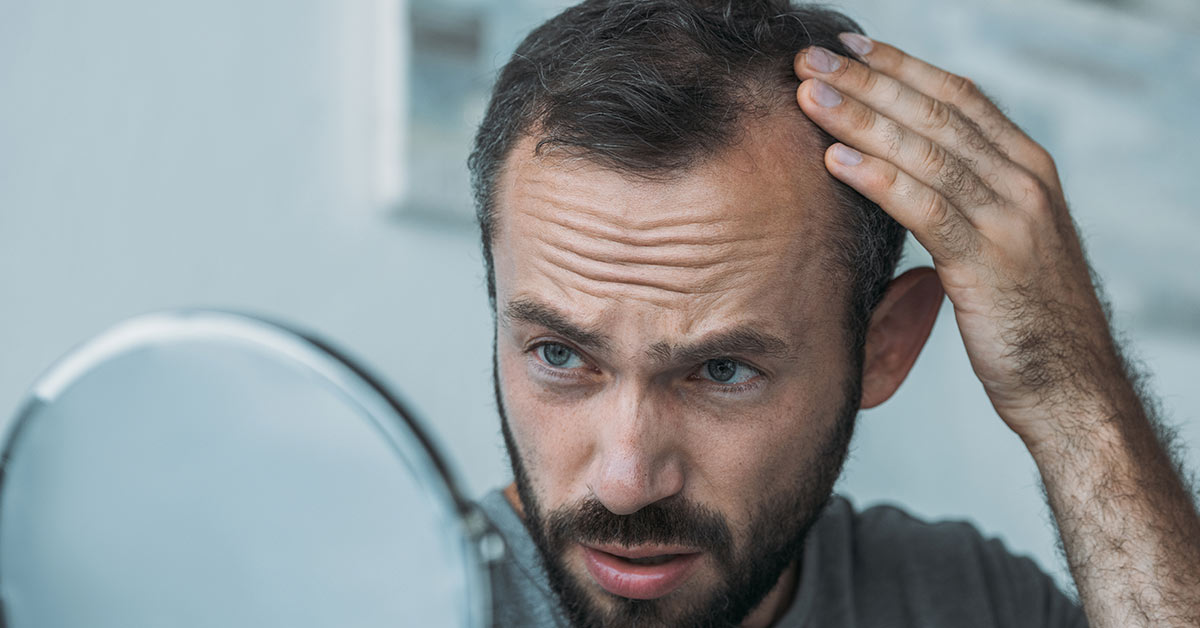To address hair loss, it’s crucial to determine what is causing it. Some forms of hair loss are reversible, and some are not. Luckily, nearly all can be treated with some combination of lifestyle changes, medications, or surgery. When it comes to choosing your path to a fuller head of hair, understanding the underlying reason for your hair loss is the first step.
Is All Hair Loss Hereditary?
Not all hair loss is genetic. Excess shedding and hair loss occur for many reasons. While heredity is by far the most common cause of hair loss… your health, your lifestyle, and even your hair styling practices may play a role. Read on to learn about five of the top reasons for hair loss.
The Top Five Causes of Hair Loss Are:
1. Genetics:
Androgenic alopecia is commonly referred to as male pattern baldness (or MPB) even though it’s not limited to men. However, in men androgenic alopecia causes a distinctive M-shaped receding hairline – often accompanied by thinning or balding at the crown of the scalp. Female pattern baldness (the term for androgenic alopecia in women) causes diffuse thinning across the scalp and is most frequently noticed as a widening part.
Both forms of pattern baldness are hereditary and typically progress with age. It may be slowed down with treatment, but it is irreversible. Most hair replacement procedures are undertaken by those who experience male pattern baldness.
2. Stress:
Psychological stress is a common cause of telogen effluvium – a type of diffuse hair loss that occurs when too many follicles are pushed into their resting phase. Stress also may be responsible for alopecia areata, a type of patchy hair loss that occurs when the immune system attacks the hair follicles. Depending on the type and extent of hair loss, some regrowth is possible if the stressor is resolved.
3. Illness:
A wide variety of diseases and health conditions cause excess hair shedding and hair loss. Anemia, autoimmune conditions, folliculitis, thyroid diseases, viruses, and vitamin deficiencies are just some of the health problems that can affect our hair.
Even pregnancy and hormonal changes can contribute to hair loss. In recent years, hair loss after COVID has been a common problem. Fortunately, in many cases, once the health issue is resolved then hair may regrow.
4. Medications:
Medical treatments, some medications, and even certain nutritional supplements can disrupt the hair’s growth cycle or damage the hair and scalp. Chemotherapy is probably the most well-known of these but medications for depression, acne, and many other conditions are also implicated in hair loss. Depending upon the medication, this kind of hair loss may resolve over time… especially if use of the medication is discontinued.
5. Hair styling:
Traction alopecia is a form of hair loss caused by hairstyles of styling techniques that pull on the hair, causing it to fall out or break. Ponytails, braids, buns, cornrows, locs, extensions, weaves, and rollers can lead to traction alopecia. In many cases, if you change your styling routine then this type of hair loss is reversible. Otherwise, it may result in permanent damage to the hair follicles.
How Do I Know What Type of Hair Loss I Have?
Based on whether your hair loss is patterned, patchy, or diffuse; it would be easy to make assumptions about its cause. Because there may be underlying issues that aren’t immediately apparent, it’s wise to get a confirmed diagnosis from a hair loss expert.
When you visit us for your initial consultation, we will ask questions about your hair loss, your family history of hair loss, and your medical history. We will assess your hair and scalp, run any necessary tests, determine the cause of your hair loss, and suggest a plan to help you achieve the hairline you desire.
How Do I Know If My Hair Loss is Normal?
It’s normal to lose up to a hundred strands of hair from throughout your scalp each day. While this may seem alarming, it’s not a cause for concern. If your hair loss exceeds a hundred strands per day, had a sudden onset, or occurs in a noticeable pattern then you should consider having a doctor assess your hair, scalp, and overall health to determine the cause.
Reef Hair: Guiding You on Your Hair Replacement Journey
Some forms of hair loss are reversible without surgery. Other types can be delayed or minimized with early intervention. Even permanent hair loss doesn’t have to end in baldness thanks to today’s safe, natural-looking hair replacement options. Reef Hair looks forward to guiding you through your hair replacement journey. Contact us today to set up a consultation.


